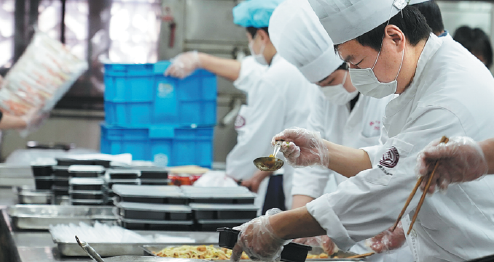Catering companies weathering the storm with online options
Sales and cooking tutorials popular on mobile app

BEIJING-Wearing a mask, chef Wang Ruofei enters a livestreaming room and introduces the process of cooking an ox bone. The show draws more than 50,000 viewers and helps sell 1,217 sets of half-prepared ingredients for ox bone soup and spicy lamb spine hotpot.
Wang is a five-star chef of Xibei, a leading Chinese catering chain brand. With an annual sales revenue of up to 6 billion yuan ($856.02 million) and more than 20,000 employees, Xibei was one of the first to feel the sales pinch amid the novel coronavirus outbreak.
China reported 889 new confirmed cases of novel coronavirus infection and 118 deaths on Thursday from 31 provincial-level regions and the Xinjiang Production and Construction Corps.
Among the deaths, 115 were in Hubei province, and the rest were in Zhejiang, Chongqing and Yunnan. Another 1,614 new suspected cases were reported on Thursday.
As the virus outbreak takes its toll, many Chinese catering companies are trying new ways to boost business, with some resorting to online cooking applications to shield themselves from the impact.
Staying indoors to avoid infection, many families in China have chosen to buy raw cooking materials and make three meals a day at home. This has created huge online traffic for cooking apps, and drawn the public to look into the apps to develop new dishes at home.
Many actors, singers and other online celebrities have recorded videos and taken pictures of themselves cooking, and uploaded the videos and photos on the apps.
According to recipe-sharing platform Douguo, its mobile app saw a spike of 113.47 percent of active daily users during the Spring Festival period. On microblog Sina Weibo, a food-related account has attracted 696,000 netizens.
Offline, many restaurants have closed to lower costs. According to a report by the China Cuisine Association, 93 percent of catering businesses they interviewed chose to close restaurants. Of them, 73 percent have closed all their outlets, while 8 percent have closed at least 80 percent of their outlets.
Even those still open are facing tepid sales and huge financial pressure. The report said 78 percent of the businesses have reported a complete loss during the epidemic. Though some businesses have maintained takeout services, 23 percent of them said the services could barely cover their costs.
"The epidemic simply cornered the companies and forced them to find a way out," said Su Jun, with the China Association of Trade in Services. "So some are cooperating with internet platforms to get out of the mire."
To help the companies out of trouble, CATS helped connect them with Douguo. In the project, the catering companies provide half-prepared food materials, and their chefs present their ways of cooking. Douguo is in charge of sales, while major courier company SF Express delivers the materials to the public.
Douguo launched a special cooking channel on the app on Feb 13, and major Chinese catering businesses have jumped on the bandwagon, including Xibei, Meizhou Dongpo and Yunhaiyao.
So far, more than 1,500 families have purchased food materials from the app. Douguo said it will invite at least 1,500 restaurant chefs to livestream themselves cooking, so that the public can learn how to pick raw materials, improve their cooking skills and study exclusive ways of making famous dishes.
"By partnering with internet food platforms, many companies have developed half-prepared materials," Su said. "Through the project, there is more interaction and trust between the companies and the consumers."
Su said despite the novel coronavirus, he sees the companies getting through the epidemic. "They might be experiencing winter, but spring is not far ahead."

Today's Top News
- US plan for arms sales to Taiwan condemned
- China creates 12.1m new urban jobs
- Dialogue constructive way to rebalance trade
- AI needs to be governed wisely to ensure that it is beneficial for future of humanity: China Daily editorial
- China warns about Japan's intended military buildup
- China urges EU to halt anti-subsidy probes






























